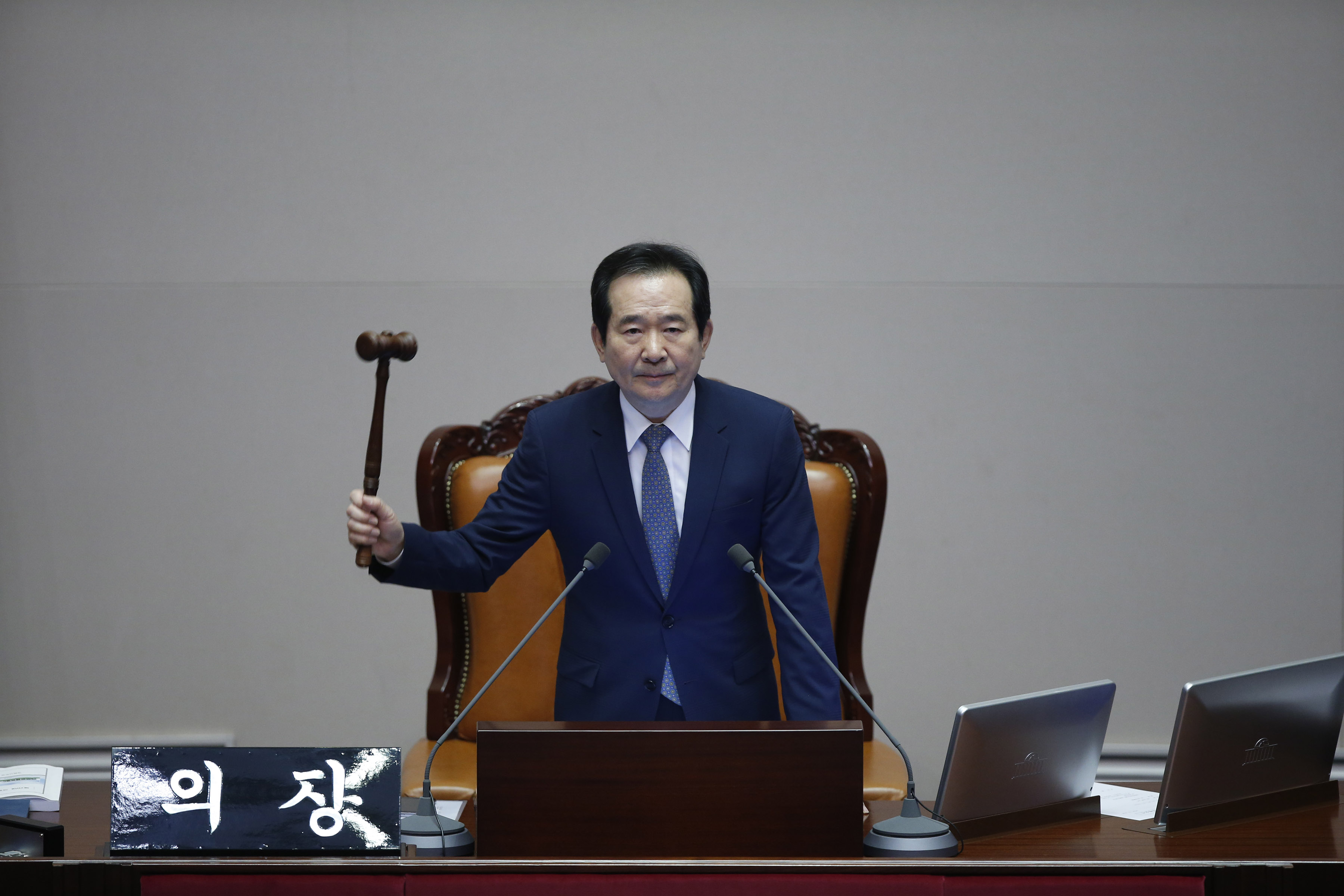
The South Korean parliament’s successful impeachment of President Park Geun-Hye on November 9 will do little, in the short term, to alleviate the deep sense of political uncertainty that has gripped the nation for months. / AFP PHOTO /
by Hwang Sunghee
Agence France Presse
SEOUL, South Korea (AFP) — The impeachment of South Korean President Park Geun-Hye has set off an early scramble among her potential successors, even before the final decision has been made to remove her from office.
While some have openly announced their intention to run, others have been more circumspect — resulting in a “phony campaign” where the declared and undeclared protagonists skirmish without really joining battle.
On paper, the next presidential election is still slated for December 2017, but Park’s impeachment could see it held much earlier.
Last week’s parliamentary vote to oust her needs to be ratified by the Constitutional Court — a process that could take six months, although most observers believe the judgement will come sooner.
If the justices confirm impeachment, Park will be permanently removed and elections must be held within 60 days — meaning a ballot could be held as early as March.
That isn’t necessarily good news for the one front runner who still hasn’t openly declared an interest in the race — UN Secretary General Ban Ki-Moon.
Until recently, Ban regularly topped opinion polls and was widely expected to run as the nominee of Park’s ruling conservative Saenuri Party.
Now, with other candidates already out of the starting blocks, Ban is hamstrung by the fact that he doesn’t step down as UN chief until the end of this year.
‘Serve my country’
In his last press briefing as secretary general on Friday, the 72-year-old said he would return to South Korea and “consider seriously” how best to serve his country.
He then embarked on what sounded like a mini stump speech, bemoaning the “turmoil” of the impeachment crisis and stressing the need for a “new type of inclusive leadership”.
Problematically for Ban, the political upheaval has ripped the Saenuri Party apart, leaving him without an obvious platform to launch and run his campaign.
“It will be difficult for Ban to win the election by himself,” said Hahn Kyu-Sup, a communications professor at Seoul National University.
“He is a little too old and there is considerable antagonism towards him among younger voters,” Hahn said.
Since the start of the current crisis, Ban has ceded his spot atop the opinion polls to Moon Jae-In, the former leader of the main opposition Democratic Party who narrowly lost to Park in the 2012 elections.
A former chief of staff to the late liberal president Roh Moo-Hyun, Moon advocates forcing reforms on the South’s all-powerful conglomerates and a policy of engagement with North Korea over its nuclear weapons program.
‘Honor’ to run
Moon has stopped short of declaring his candidacy, but organised a rare press briefing with foreign correspondents in Seoul last week and said what a “huge honor” it would be to run in the next election.
He also flagged some key policy changes he might implement, including reconsidering the deployment of an advanced US missile defence system to cope with North Korean threats.
If it was campaigning in all but name, his party said it was warranted given the circumstances.
“Once the court makes the ruling, we have to pick a new president in 60 days,” said Kang Sun-A, deputy spokeswoman for the Democratic Party.
“The elections will happen at least six months earlier than scheduled so the candidates have no choice but to prepare,” Kang told AFP.
The possible problem for Moon and Ban, who served as foreign minister from 2004-2006, is that they are both establishment figures at a time of growing anti-establishment sentiment.
The move to impeach Park was triggered by public outrage at a corruption scandal involving a close friend of the president’s who is now facing trial for fraud and abuse of power.
But the anger has been fueled by something more basic.
“The fact that millions of people are taking to the streets every Saturday reflects a level of deep-rooted dissatisfaction with society,” said Hahn.
Slowing economic growth, rising unemployment and widening income disparities have left many younger Koreans disenchanted with the political status quo.
Liberal insurgent
Riding the call for change is the liberal mayor of Seongnam city, Lee Jae-Myung, whose vocal criticism of the president and calls for her to be “jailed for life” caught the public mood.
A recent Gallup poll showed Lee with 18 percent support, close to Moon and Ban and a leap of 13 percentage points from a pre-crisis poll conducted in October.
Unlike the other presumed contenders, Lee has declared his intention to run and has already started disparaging his likely rivals.
Asked to evaluate Ban’s candidacy in a recent interview, Lee said his own experience as a local official dealing with local issues carried more weight than heading the United Nations.
“As pragmatic values gain more importance, fancy experiences are no longer attractive,” Lee said.
© 1994-2016 Agence France-Presse







